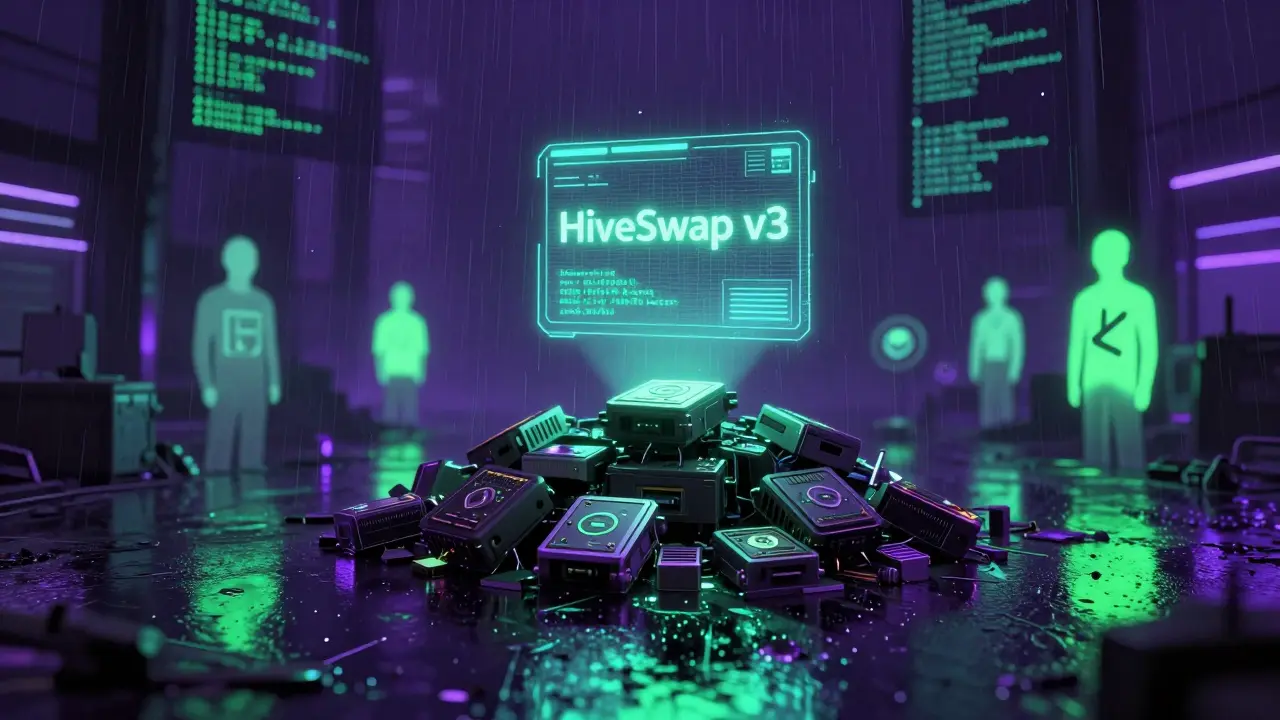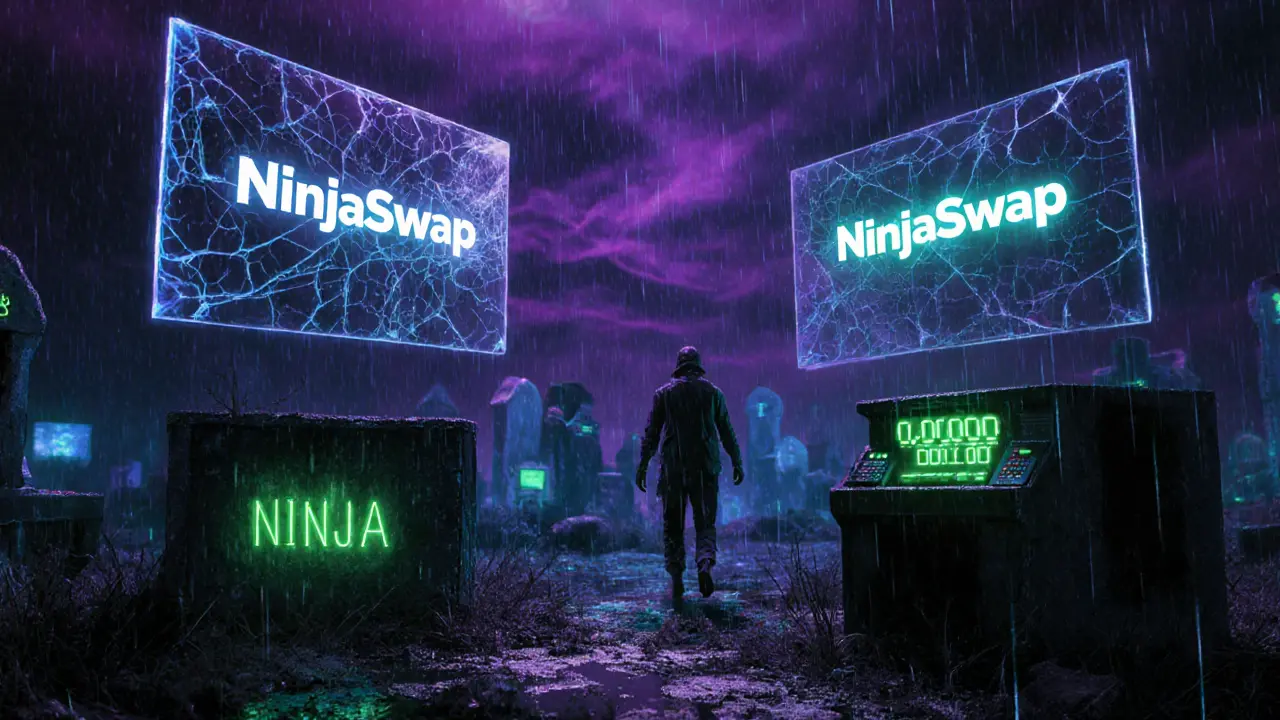ELDEX Risk Assessment Tool
| Feature | ELDEX | Uniswap | PancakeSwap | dYdX |
|---|---|---|---|---|
| TVL | Not disclosed | $4.3B | $2.1B | $350M |
| Trading Fees | Unverified (claimed 0.03%) | 0.30% (0.05% for LPs) | 0.20% | 0.015% - 0.05% |
| Token Support | Unknown | All ERC-20 | BSC BEP-20 + ERC-20 | Spot & Derivatives (selected pairs) |
| Audit Status | No public audit | Audited (multiple reports) | Audited | Audited + formal verification |
| Community Presence | Virtually none | Active Reddit, Discord, Twitter | Active community | Strong institutional following |
When you see a new name on a crypto platform list, the first question is: ELDEX review - is it trustworthy, liquid, and worth your time? This article pulls together every shred of data that’s publicly available, compares ELDEX to the heavy‑hitters in the DEX world, and highlights the red flags you should watch before you ever connect a wallet.
Key Takeaways
- ELDEX is listed on CoinMarketCap as an “Untracked Listing,” meaning no verified volume or reserve data.
- Liquidity is effectively unknown - unlike Uniswap ($4B+ TVL) or dYdX (>$350M TVL).
- No official docs, whitepaper, or community channels have been found.
- Regulatory exposure is unclear; the platform offers no compliance statements.
- For most traders, established DEXs provide far better security, support, and transparency.
What Is ELDEX?
ELDEX is a cryptocurrency exchange that claims to operate as a decentralized platform, allowing peer‑to‑peer token swaps without a central order book. Beyond that brief claim, the public footprint is minuscule - no whitepaper, no audited smart‑contract code, and no visible team identity.
Transparency & Data Availability
The only concrete reference comes from CoinMarketCap a market‑data aggregator that categorises listings based on verification standards. ELDEX appears under the “Untracked Listing” banner, which according to their Listings Review Criteria SectionB‑(3) means the exchange has not provided sufficient proof of reserves, trading pairs, or volume.
All fields on the CoinMarketCap page - total assets, reserve data, number of pairs - display “No data.” In a market where even new projects publish at least a basic token list, the silence is a warning sign.
Liquidity & Market Position
Liquidity is the lifeblood of any DEX. To put ELDEX in context, here are the TVL figures for the most visited platforms in 2025:
- Uniswap - $4.3billion TVL
- PancakeSwap - $2.1billion TVL
- Curve - $4.0billion TVL
- dYdX - $350million TVL (derivatives focus)
ELDEX offers no public TVL number, no volume charts, and no disclosed liquidity providers. The practical effect? A trader who tries to execute a modest trade could face extreme slippage or outright transaction failure.

Feature Comparison
| Feature | ELDEX | Uniswap | PancakeSwap | dYdX |
|---|---|---|---|---|
| TVL | Not disclosed | $4.3B | $2.1B | $350M |
| Trading Fees | Unverified (claimed 0.03%) | 0.30% (0.05% for LPs) | 0.20% | 0.015% - 0.05% |
| Token Support | Unknown | All ERC‑20 | BSC BEP‑20 + ERC‑20 | Spot & Derivatives (selected pairs) |
| Audit Status | No public audit | Audited (multiple reports) | Audited | Audited + formal verification |
| Community Presence | Virtually none | Active Reddit, Discord, Twitter | Active community | Strong institutional following |
The table underscores a stark reality: ELDEX simply lacks the data points that investors rely on to assess safety and value.
User & Community Insight
Every reputable DEX has a bustling forum where users share swap experiences, report bugs, and discuss fee structures. A quick sweep of Reddit, Twitter, and Trustpilot returns zero meaningful mentions of ELDEX. In contrast, platforms like Balancer offers weighted pools and a vibrant dev community and 1inch is known for low‑fee routing across multiple DEXes generate thousands of daily posts.
This silence could mean ELDEX is brand‑new, immediately shut down, or operating in a niche that never gained traction. Either way, the lack of user feedback removes a crucial safety net.
Risks & Red Flags
Based on the data gap, here are the top risks you should weigh:
- Liquidity uncertainty - No TVL or volume data; potential for severe slippage.
- Regulatory opacity - No KYC/AML statements; unknown jurisdiction.
- Smart‑contract opacity - No public audit, source code, or bug bounty program.
- Community vacuum - No forums, social channels, or developer updates.
- Potential exit scam - Untracked status makes it hard to trace fund movement.
If any of these items are deal‑breakers for you, it’s wiser to stick with established DEXs that publish these metrics openly.
How to Proceed - Decision Checklist
- Do you need a DEX for a specific token that only ELDEX claims to support? Verify the token contract on a block explorer.
- Can you tolerate high slippage? Test with a minimal swap (e.g., $5) and monitor the outcome.
- Are you comfortable with no customer support? Consider the risk of lost funds.
- Do you have a backup plan? Keep assets on a wallet you control, not locked in an unknown contract.
Most users will find that the safety and feature set of Uniswap, PancakeSwap, or dYdX outweigh any speculative advantage ELDEX might claim.
Frequently Asked Questions
Is ELDEX a centralized or decentralized exchange?
ELDEX markets itself as a decentralized exchange, but without published smart‑contract code or audits, the exact architecture remains unverified.
Can I check ELDEX’s liquidity before trading?
No reliable on‑chain data or third‑party trackers list ELDEX’s liquidity pools, so you can’t gauge slippage in advance.
Has ELDEX ever been audited?
Public records show no audit reports from reputable firms. Trading on unaudited contracts carries higher risk.
What fees does ELDEX charge?
The platform claims a 0.03% fee, but without transparent fee tables or transaction receipts, the actual cost is unconfirmable.
Should I use ELDEX for large trades?
Given the unknown liquidity and lack of community oversight, large trades are discouraged. Stick to proven DEXs for sizable positions.








Comments
14 Comments
Alie Thompson
It is a profound ethical failure for any trader to even contemplate supporting a platform that hides its liquidity behind a veil of anonymity, and this betrayal of transparency strikes at the very heart of responsible participation in the crypto ecosystem. The ELDEX review highlights a cascade of red flags that any morally conscious individual should heed, from the absence of audited smart‑contract code to the conspicuous lack of community engagement. When a project refuses to disclose basic metrics such as total value locked, it implicitly signals that it has something to hide, and such opacity is antithetical to the ideals of decentralization. Moreover, the regulatory opacity-no KYC/AML statements, no jurisdictional clarity-means that users are effectively flying blind into a legal minefield, exposing themselves to potential enforcement actions without any recourse. The risk of an exit scam, as underscored by the “untracked listing” status on major aggregators, further amplifies the moral urgency to warn others. It is not merely a matter of financial prudence; it is a matter of collective responsibility to protect fellow participants from predatory schemes. By voluntarily engaging with ELDEX, one tacitly endorses a culture of secrecy that undermines trust across the entire DeFi landscape. The lack of a public audit is tantamount to a declaration that the code has never been vetted by independent experts, leaving users vulnerable to hidden vulnerabilities and malicious backdoors. The absence of any discernible community-no Reddit, Discord, or Twitter presence-means there is no collective oversight, no crowd‑sourced vigilance to catch bugs or abuses. In a space where community governance is often the first line of defense, such a vacuum is a glaring omission. The platform’s claim of a 0.03% fee, unverified and unsubstantiated, further illustrates a pattern of dubious self‑promotion that relies on unverifiable statements rather than hard data. From a moral standpoint, supporting a project that does not adhere to basic standards of openness is tantamount to complicity in deception. The potential for severe slippage or transaction failure, as highlighted by the lack of TVL data, can lead to immediate financial loss for unsuspecting users, reinforcing the ethical imperative to steer clear. In sum, the ELDEX review serves as a cautionary tale: if a platform cannot transparently demonstrate its fundamentals, it ought to be shunned, not embraced, by any community that values integrity, safety, and the collective good.
Samuel Wilson
While the concerns raised are certainly valid, it is also important to adopt a balanced perspective; conducting a minimal test swap can provide empirical data on actual slippage and transaction success rates without exposing significant capital. A disciplined approach-starting with a $5 trade-allows you to observe the platform’s behavior firsthand, and if the results align with expectations, you may consider modestly increasing exposure. Remember, thorough due diligence combined with incremental experimentation is a prudent strategy for navigating unverified services.
Rae Harris
Yo, everyone actin' like ELDEX is the devil’s playground, but let’s be real – the DeFi space is saturated with hype, and sometimes a low‑profile project can be the next hidden gem; you just gotta sniff out the on‑chain metrics, check the router paths, and gauge the gas‑optimised swap routes before you dismiss it outright. The absence of a public audit doesn’t automatically make it a scam, it could simply be a newer protocol still polishing its codebase, so i’d say keep an eye on the tokenomics and maybe run a few micro‑trades to see if the liquidity pools actually hold water. Bottom line: don’t let fear‑mongering blind you to potential arbitrage opportunities.
Danny Locher
Sounds like a solid plan, just remember to keep the stakes low at first and watch how the price moves; if the swap goes through without crazy slippage, that’s a good sign the pool isn’t empty. Also, make sure you have control of your private keys, because if anything goes wrong you’ll want to be able to move your assets quickly.
Emily Pelton
Honestly, if you’re even considering a platform that refuses to publish basic data, you’re already ignoring the fundamental principle of transparency, which is, frankly, non‑negotiable in any reputable financial ecosystem, and while I get the desire to chase novelty, the cost of a potential rug‑pull far outweighs the speculative upside, so please, for the sake of your own portfolio safety, stick to exchanges with clear audits, community support, and verifiable liquidity metrics, otherwise you’re just gambling with other people’s money and that’s just irresponsible.
sandi khardani
Let me break it down for those who still think ELDEX is anything more than a glorified black box: first, the complete lack of a publicly available smart‑contract audit is a glaring indicator that the developers either can’t afford a proper security review or, worse, are actively concealing vulnerabilities. Second, the null TVL and volume figures mean you’re essentially trading on a phantom market, where any sizeable order will either evaporate into the ether or trigger monstrous slippage that could wipe out your position in seconds. Third, the regulatory silence-no KYC, no AML, no jurisdiction-exposes users to potential legal repercussions without any recourse, a scenario that seasoned traders have learned to avoid. Fourth, the community vacuum is not a neutral absence; it is a strategic void that prevents collective scrutiny, making it impossible to crowd‑source bug reports or pressure the team for transparency. Finally, the platform’s claim of a 0.03% fee is unverifiable, and any discrepancy could be a hidden revenue stream siphoning funds from unsuspecting users. In summary, ELDEX is a textbook example of a high‑risk, low‑trust environment that should be approached with extreme caution, if at all.
Fiona Chow
Wow, you really love to paint a bleak picture, huh? Funny how every missing piece magically turns into a red flag-maybe the lack of a community is just a sign that they’re focusing on stealth mode development, not that they’re “vacuuming” users. But sure, let’s assume the worst and ignore the possibility that a fresh protocol could be under the radar for a reason other than malice.
Rebecca Stowe
Even if we’re being cautious, there’s always room for optimism; a new platform could bring innovative features that established DEXs haven’t explored yet, so keeping an open mind while testing with tiny amounts might uncover hidden value.
Mark Briggs
Sounds like a scam.
mannu kumar rajpoot
Ever notice how every “untracked” project suddenly appears after a series of obscure offshore shell companies are set up, and the regulators quietly turn a blind eye? It’s like the deep state of crypto is pulling strings behind the scenes, and ELDEX is probably just another puppet in that shadow network, waiting for the next covert move.
Hardik Kanzariya
I understand the concerns, and while it’s easy to get caught up in speculation, the safest approach is still to prioritize platforms with clear audits and active community support; that way you protect yourself from unknown risks while staying open to genuine innovation.
Shanthan Jogavajjala
From a technical standpoint, the absence of on‑chain analytics, combined with the lack of a formal verification report, suggests that any swap on ELDEX could be subject to hidden state‑transition bugs; essentially, the protocol’s gas‑cost model and routing algorithm remain undocumented, which raises serious concerns about MEV exposure and front‑running susceptibility.
Millsaps Delaine
One must not merely skim the surface of an emerging protocol and render an assessment founded upon a superficial appreciation of its advertised features; rather, an exhaustive exegesis demands a meticulous deconstruction of its underlying architecture, the provenance of its development team, and the epistemic foundations upon which its purported decentralization claims rest. In the current climate, where tokenomics are oft‑obfuscated behind a veil of speculative hype, it becomes incumbent upon the discerning analyst to interrogate the contractual codebases for any latent back‑doors, to scrutinize the provenance of liquidity provision, and to benchmark the platform against established benchmarks such as Uniswap’s immutable contract verification. Moreover, one should consider the sociotechnical ecosystems-governance forums, developer activity, and community-driven audit initiatives-as integral variables within any holistic risk matrix. Thus, to casually dismiss ELDEX without this thorough ontological audit would be an intellectual misdemeanor, yet to accept it uncritically would be an even greater folly, given the ever‑present specter of exit scams that have plagued the DeFi frontier.
Jack Fans
Alright, folks, let me break it down-if you’re looking for a safe haven, stick to platforms that have a solid audit trail, a vibrant community, and transparent liquidity metrics, because, let’s be real, those are the pillars of a trustworthy DEX; any deviation from these standards should raise an immediate red flag, wat? Also, double‑check the contract address on etherscan before you even think about a swap, because a simple typo can cost you dearly.
Write a comment